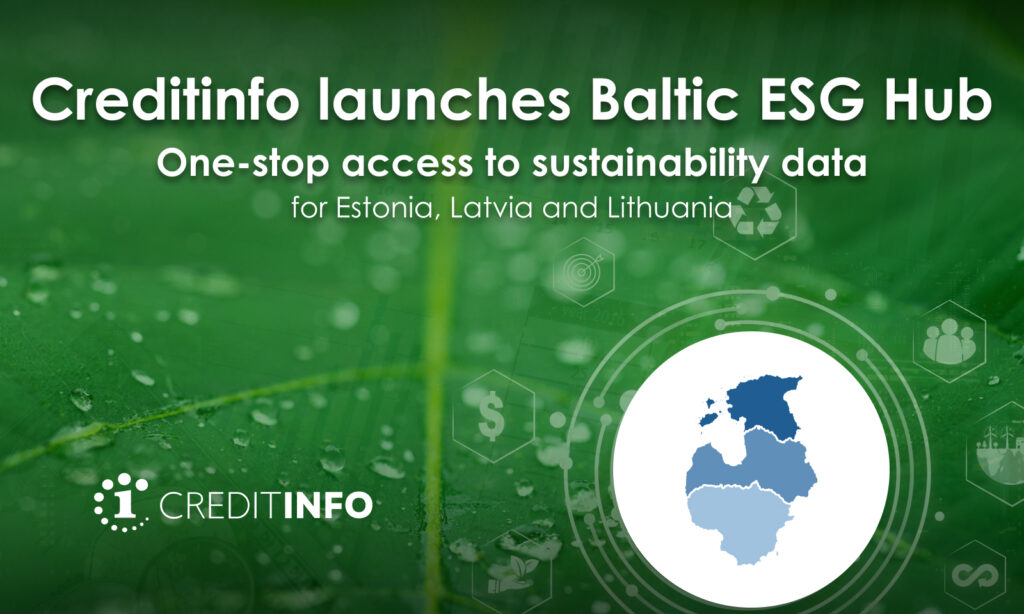Creditinfo Launches ESG Hub to Fast-track Baltic Companies’ Access to Reliable Sustainability Data

New one-stop-shop solution aggregates information from more than 20 external sources, helping banks and businesses boost their ESG strategies, manage risk, and streamline their supply-chain transparency.
Creditinfo unveiled ESG Hub, the Baltic region’s first pan-regional platform that gives lenders and businesses instant, standardised access to the environmental, social and governance (ESG) data they need to comply with regulations, assess counterparties and execute sustainability strategies.
Building on Creditinfo’s long track-record of turning complex business information into accessible actionable insight, ESG Hub consolidates data from 20-plus public and proprietary data sources from Estonia, Latvia and Lithuania into one standardised API feed and ready-to-use report. By merging country-specific registries into a single, harmonised view, the platform lets banks and businesses manage ESG data uniformly across all three markets. Users can pull company-level metrics—from carbon emissions and energy intensity to board diversity and community impact—within seconds, eliminating the need to piece together separate national datasets manually.
“We want to accelerate the sustainability journey for the Baltic economies, and it all starts with easy access to trusted information. Until now, assembling ESG data has been difficult and time-consuming; companies have spent substantial time on these tasks, and the process has been inefficient,” said Elari Tammenurm, Regional Director, Continental Europe at Creditinfo. “With ESG Hub, any financial institution or company can integrate harmonised data directly into their existing workflows, cutting cost and complexity while improving decision speed.”
Proven model, now scaled to the Baltics
Creditinfo first introduced an ESG data service in Iceland in 2023; rapid adoption by local banks and corporates highlighted the growing importance of reliable sustainability intelligence. “The strong uptake we saw in Iceland showed us how big the need is,” noted Reynir Smári Atlason, Managing Director of Sustainability at Creditinfo. “We’re now bringing those learnings, and a richer dataset, to the Baltic markets.”
The company will continue to expand ESG Hub’s data source coverage and analytical modules over the coming months. Future roll-outs in additional Creditinfo markets are also planned.
For more information visit ESG Hub
Op-ed: Reliable Sustainability Information is only the first step

A thought-provoking discussion has taken place about corporate sustainability information and the increasing regulatory requirements of such frameworks. It is often pointed out that the cost of disclosure can be high and the process complicated. In this context, it is worth noting that corporate sustainability information goes beyond the data that public authorities require them to publish. Corporate sustainability data appear, for example, in lawsuits, the media, annual reports, and various forms throughout the value chains of companies, to name a few examples. To capture corporate sustainability data comprehensively, it is also important to place companies in the context of the industries they belong to and the risks they face, both directly and indirectly, through their value chains. While standardized data mandated by government requirements represent a significant step forward, they are only one piece of the puzzle of information needed by the financial market and, in some cases, are not even the most critical information that market participants need.
Sustainability Information Will Remain Unreliable
Corporate sustainability information has evolved from being a product of marketing departments to following guidelines generally accepted by market participants and ultimately falling under regulatory frameworks. Despite recent complex regulations related to sustainability disclosures (such as the CSRD, the EU Taxonomy Regulation, and SFDR), these are not exhaustive of the information that market participants need for informed decision-making. This means that if an analyst is to assess a company with sustainability in mind, there are other factors, beyond what the regulatory framework prioritizes and companies report. These include external factors in companies’ value chains, such as crop failures abroad, fluctuations in commodity prices due to weather anomalies, access to company products in key markets due to social instability, as well as information generated more frequently than annual reports can indicate (such as information from lawsuits and the media). The data companies will provide in line with regulatory frameworks represent a significant step forward, but only the first step toward more reliable sustainability disclosures.
Access to Data Would Have Been a Problem
Even though companies disclose information in accordance with regulations, this does not guarantee stakeholders’ access to it. Part of the problem is technical in nature, as sustainability information is published in, for example, scanned annual statements, various types of sustainability reports, and websites in formats that do not always comply with regulatory guidelines. The European Union has not addressed this issue clearly. At some point, the European Union will establish a database (the European Single Access Point, ESAP), which will receive reports in a predefined format. This database is expected to be operational earliest by 2027, according to official EU information. It is therefore important that sustainability data about companies are collected centrally. At Creditinfo, we proudly undertake this task as it involves critical corporate information.
Reducing the Burden on Companies
The Icelandic financial sector wants to access reliable sustainability information about companies. It seeks this information partly because legal requirements stipulate that financial institutions must have this data available, but also because financial industry employees take sustainability risk seriously, as clearly reflected in bank risk reports. Companies outside the financial market have also sent questionnaires to their suppliers to obtain sustainability information. As a result, companies often receive multiple such questionnaires every year from various sources. At Creditinfo, we see significant waste occurring here. Instead of having a multitude of questionnaires circulating, we realized that it would make more sense if companies answered one such questionnaire, making it accessible to all interested parties. That questionnaire is now available through Vera, Creditinfo’s sustainability platform, and hundreds of companies have filled it out, simultaneously minimizing the associated burden as interested parties can simply access the questionnaire via Vera.
Most companies in Iceland do not fall under the regulations that have been most widely discussed (such as the CSRD and the Taxonomy Regulation). However, this does not mean that this issue is being neglected by them—on the contrary. That is why we have made efforts to give these companies the opportunity to present their information on a larger platform than has been available to them before, through our sustainability platform, Vera.
The Reason for Collecting Data
The discussion about corporate sustainability information has focused more on the quantity and quality of the data than on the reason for its collection. The truth is that greenhouse gas emissions reached a historical high in 2022, at 54 billion tons of CO2 equivalent, about 30% of the global population lacks access to clean drinking water, 13% of individuals over the age of 15 are illiterate, and 10% of the global population is undernourished. In this regard, the financial system is in a key position to improve living conditions and our future. It is important not to lose sight of the goal and get lost in discussions about regulations and data. At Creditinfo, we want to continue to promote the reliability and accessibility of sustainability information about Icelandic companies so that informed decisions can be made for the benefit of all.
Authors:
Hrefna Sigfinnsdóttir, CEO of Creditinfo in Iceland
Reynir Smári Atlason, Head of Sustainability at Creditinfo
Creditinfo launches ESG Data Platform

Reykjavík / London, 20th October 2022 – Creditinfo Group, the leading global service provider for credit information and risk management solutions, has today announced the launch of VERA, a new environmental, social and corporate governance (ESG) data platform. The pioneering platform will provide financial services with a standardised overview of their ESG performance, helping them comply with ESG regulation, and will also create a way for other organisations to easily provide sustainability data to the financial sector.
VERA is a centralised platform that congregates information from a range of sources, including data directly reported by companies as well as external sources such as media coverage, judicial information, and supply chain operations. The information is then automatically standardised to allow organisations across financial services to obtain a holistic overview of ESG factors and performance, and easily establish how best to comply with regulation.
Initially being rolled out in Iceland, with other regions to follow globally, the platform can also be used by non-financial corporations when conducting supplier assessments to determine the ESG performance of their supply chains, and to provide sustainability data in a standardised way to the financial sector, helping to attract investment.
Reynir Smári Atlason, Director of sustainability at Creditinfo said: “Providing ESG information to financial services strengthens the presence and engagement of financial institutions – especially in markets where sustainability data is generally limited. It’s not only an ethical decision but a practical one – various markets don’t have the regulations in place to hold companies to account, yet ESG data is needed if they’re going to attract investment through sustainable financing. We’re really proud of how this platform levels the playing field and makes this information accessible and digestible.”
The VERA platform comes on the heels of Creditinfo’s own sustainability policy as the next step in its overall ESG strategy. Creditinfo’s aim to facilitate better decision making in financial services and enable greater access to finance for underserved SMEs, companies and individuals without credit ratings means it plays a vital role in social sustainability globally, and transparency in its environmental and social dealings across its regions must be a fundamental part of this.The next step will see the company publish its inaugural sustainability report evaluating performance areas against its sustainability policy in 2023.
Paul Randall, CEO at Creditinfo said: “Our ESG data platform and sustainability policy are just the first steps in understanding and addressing our wider external impact and helping others to do the same. Not only do we need to make sure we comply with regulation in this area, but the responsibility also lies with individual companies to be proactive when it comes to innovating in a sustainable and responsible way. We’re ready to lead by example here and I’m very excited by our ESG data platform and sustainability policy to ensure Creditinfo and other financial services are on track and compliant with regulation.”
Creditinfo’s sustainability policy can be found in full here.
ENDS
About Creditinfo
Established in 1997 and headquartered in London, UK, Creditinfo is a provider of credit information and risk management solutions worldwide. As one of the fastest-growing companies in its field, Creditinfo facilitates access to finance, through intelligent information, software and decision analytics solutions. With more than 30 credit bureaus running today, Creditinfo has the most considerable global presence in this field of credit risk management, with a significantly greater footprint than competitors. For decades it has provided business information, risk management and credit bureau solutions to some of the largest, lenders, governments and central banks globally to increase financial inclusion and generate economic growth by allowing credit access for SMEs and individuals. For more information, please visit www.creditinfo.com




